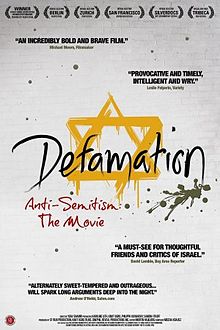- Defamation (film)
-
Defamation 
Directed by Yoav Shamir Produced by Sandra Itkoff
Karoline Leth
Philippa Kowarsky
Knut OgrisDistributed by First Run Features Release date(s) February 5, 2009 (Berlinale)
November 20, 2009 (United States)Running time 91 minutes Country Israel Language English
HebrewDefamation (Hebrew: השמצה; translit. Hashmatsa) is a 2009 documentary film by award-winning filmmaker Yoav Shamir. The film examines antisemitism, and in particular the way perceptions of antisemitism affect Israeli and U.S. politics. The film won Best Documentary Feature Film at the 2009 Asia Pacific Screen Awards.
Contents
Content
The film examines whether "'anti-Semitic' has become an all purpose label for anyone who criticizes Israel and the possibility that some Jews' preoccupation with the past -- i.e., the Holocaust -- is preventing progress in the here and now.[1] Shamir decided to make this film after a critic of an earlier film accused him of antisemitism.[1]
Filmmaker Yoav Shamir states in the beginning of the film that as an Israeli he has never experienced antisemitism himself and wants to learn more about it since references to antisemitism in countries all over the world are common in the Israeli media.
The film includes interviews with Abraham Foxman, the head of the Anti-Defamation League, John J. Mearsheimer, co-author of New York Times Best Seller The Israel Lobby and U.S. Foreign Policy, Norman Finkelstein, a critic of Israeli government policy as well as many others. The film also follows a group of Israeli high school students on a class trip to Europe where they tour Auschwitz, as well as a number of other notable Holocaust locations.
The film notes that in 2007, the ADL reported a spike in antisemitism, claiming that there were 1,500 anti-Semitic incidents in the United States, yet when Shamir contacts the ADL they can only list minor incidents such as websites with inflammatory comments, letters from employees denied time off for a Jewish holiday, or people offended by a cop's use of the word "Jew". A case presented concerns a group of African American boys, aged between 10 and 12, who pelted a school bus with rocks, breaking two windows.
Shamir also interviews a rabbi who says that the hypervigilance of the ADL inflames relations between Jews and non-Jews in the United States. He also finds that among his interviewees there is more sensitivity to antisemitism among secular Jews than religious ones.[1][2]
Reception
Rotten Tomatoes lists 13 positive and 3 negative reviews, giving it an 81% approval rating.[3]
After the film was screened at the Tribeca Film Festival, the Anti-Defamation League issued a statement denouncing the film, stating that it "belittles the issue (of antisemitism) ... and cheapens the Holocaust. It is Shamir's perverse, personal, political perspective and a missed opportunity to document a serious and important issue."
New York Times reviewer Neil Genzlinger states that while these ideas deserve a thorough and dispassionate discussion, Shamir has not provided it in this film. "...it feels like just another day on the Op-Ed page."[4]
Boston Globe reviewer Ty Burr wrote "Unlike many agit-docs, Defamation wants to get you thinking, and it knows the epithet “self-hating Jew’’ can be used as a club by those who don’t want you to think at all." He reviewed the film positively, highlighting how the film argues that raising Israelis to define themselves as a nation of victims is a disservice to modern complexities - and, not coincidentally, makes it almost impossible to see any other people as victims. “Who would I like to kill?’’ one Israeli girl tearfully tells Shamir after touring Auschwitz. “All of them.’’ The filmmaker gently asks us to ask ourselves if this is what “never forget’’ should really mean. [5]
The review in the Los Angeles Times praised the documentary for showing "how accusations of anti-Semitism can easily be exploited for political purposes. The reviewer commended the filmaker for his fairness writing that "even though Defamation, which is sprinkled with unexpected moments of wry humor, will be inescapably controversial, Yoav Shamir strives admirably to be evenhanded."[6]
References
- ^ a b c Curiel, Jonathan (November 15, 2009). "Yoav Shamir draws flak for film 'Defamation'". SFGate. http://articles.sfgate.com/2009-11-15/entertainment/17179337_1_anti-semitism-debate-interviews.
- ^ "Exploring The Politics Of 'Defamation'". National Public Radio. http://www.npr.org/templates/story/story.php?storyId=120452232.
- ^ "RottenTomatoes". http://www.rottentomatoes.com/m/defamation/. Retrieved 21 November 2010.
- ^ Movie Review (Defamation) Neil Genzlinger, New York Times, November 20, 2009
- ^ Ty Burr (December 04, 2009). "‘Defamation’ covers heated ground". http://articles.boston.com/2009-12-04/ae/29258124_1_anti-semitism-semitism-yoav-shamir/2.
- ^ Kevin Thomas (November 20, 2009). "Exploring issues of anti-Semitism". http://articles.latimes.com/2009/nov/20/entertainment/la-et-capsules20-2009nov20.
External links
- Official website
- Defamation at the Internet Movie Database
- Defamation from First Run Features.com
- Defamation from Hartley Film Foundation
Categories:- 2009 films
- Israeli films
- English-language films
- Hebrew-language films
- Israeli documentary films
- 2000s documentary films
- Jewish documentary films
- Antisemitism
Wikimedia Foundation. 2010.
